What’s the deal with New Mexico’s PRC?

If you’ve never heard of the state’s Public Regulation Commission, you’ve likely still observed the consequences of its decisions in your daily life. On your electricity bill, for example. Or your gas bill. Your water bill.
Commissioners also have a hand in broadband and telecommunications around the state, and field consumer complaints.
Transportation, too. Staff with the PRC inspect the state’s railroads and investigate accidents, and the commission enforces railway safety rules. The commission regulates the industries that use ambulances, limos, wrecking trucks, taxis.
So even if you don’t think you know the PRC, you’re probably pretty familiar with its work.
NM High Court denies Indigenous groups’ attempt to block changes to PRC
And this governmental body will wield significant power as this part of the country stares down the barrel of climate change.
We feel it out here. It’s the heat wafting off historic wildfires all summer long. It’s the hard, dried crust over the riverbed where there was supposed to be water.
Will utility companies move away from greenhouse gas-spewing industries while still reliably powering the state and keeping the digits on your monthly bill reasonable? That’s the sort of questions commissioners will face.
Today, there are five commissioners. They were all elected.
Next year, there will only be three. They will be appointed by Gov. Michelle Lujan Grisham.
On Friday, a committee will recommend at least five applicants to the governor.
That committee combed through résumés, sent out and collected questionnaires. Fifteen people are up for the gig now. We’ve sketched out the basics for you on each. (Marisa Demarco)
Amy L. Stein
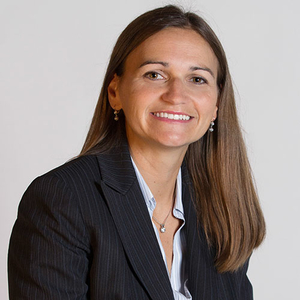
In 2008, Amy Stein left her job as a corporate lawyer with the mega-firm Latham & Watkins, LLP and jumped into academia and cultivated research for classes on Energy Law and Policy. In 2022, she received tenure at the University of Florida Levin College of Law where she also teaches Climate Change Law and Artificial Intelligence, Technology. She moved to New Mexico six years ago and quickly got involved in energy policy discussions in Santa Fe. She was on the steering committee of the state’s Energy Roadmap, a group created by the 2017 Legislature to design plans for things such as energy diversification, incentives for companies to cap emissions and identifying which state agencies are responsible for overseeing the goals outlined in the plan.
Her worldview that government and business must work to ensure energy policies are not only providing the lowest costs for customers, but also share a responsibility to curb pollution is evident in her support for the New Mexico Energy Transition Act signed into law in 2019. The act sets a deadline to boost the energy sector by meeting goals of 50% renewables by 2030 for the state’s investor-owned utilities and rural electric cooperatives, and a goal of 80% by 2040.
“This appointment would serve as an opportunity to serve all of New Mexico’s diverse communities in ways that ensure safety, just and reasonable rates, and accessibility of these services,” Stein said. “For instance, I am not naïve that implementation of New Mexico’s Energy Transition Act will be a challenge in a state with such diverse energy resources, but my expertise and commitment to this transition would serve me well as commissioner.”
Stein said she would request a leave of absence from her teaching duties in Florida if she is appointed to the committee. (Shaun Griswold)
PNM customers continue to pay for San Juan coal plant that’s no longer operating
Cholla Khoury
The commissioner role would be new but not entirely foreign to Cholla Khoury. The lawyer has worked the entire duration of her 12-year professional career with the New Mexico Attorney General’s Office. Under Gary King, she served as a litigator and rose through the ranks in office under outgoing AG Hector Balderas.
Her experience with issues directly involved with PRC duties started in 2014 while working under the Water, Environment and Utilities Division. She said this role required her to represent the state and New Mexicans on legal proceedings involving rate disputes, mergers and power plant abandonment including the closure of the San Juan Generating Station and subsequent fallout of potential overcharges to customers in the Four Corners region.
Her role as the director of the Consumer and Environmental Protection Division expanded the scope of her responsibilities while working with the PRC on the matters involving the San Juan plant. When asked what is something she considers a, “consequential action or decision of the PRC in the last twenty years?” Khoury answered that the PRC’s role started the process to close the plant and set standards for future closures.
“That decision was the catalyst, for its successes and failures, for energy policy as it currently exists in our state,” she said.
Khoury was born in Washington and grew up in Moriarty. (Shaun Griswold)
Ward Camp

Many of the applicants for the commission are attorneys that have worked directly for the energy sector industry, and some such as H. Ward Camp put down the legal shield to take on other jobs within the field.
Camp’s first job in 1998 after more than 20 years representing energy companies, including a seven year-stint as outside counsel for the Gas Company of New Mexico, was as the vice president of Avistar, a subsidiary of PNM.
This led to his current career tracking government affairs and policy so energy companies he represents can meet state or federal regulations for their projects. The bulk of his most recent work has been with electric companies, modernizing their grid infrastructure and selling the technology to companies integrating it into homes.
Camp stresses that his decision-making is guided by legislation and the policies that the state or federal government enacts. For instance, he said he would take on matters of climate change if those policies were directed by lawmakers.
“As commissioner the duty is to implement the law, not legislate,” he wrote. “So compliance with laws may require eliminating certain energy sources. I again note beneficial electrification, I would look at a program addressing climate change if it met the same criteria as beneficial electrification.” (Shaun Griswold)
Cynthia B. Hall

Elected to serve on the PRC in 2016, Cynthia B. Hall is trying to keep her job after voters in 2020 opted to have the governor appoint commissioners. The changes mean Hall must now apply for appointment to one of three seats instead of running for re-election for one of five. She currently serves as the PRC chair.
Hall’s application boasts achievements only someone who has sat on the PRC can attain. After several years of debate, she won a change in the procurement process that requires more transparency on how electric utility projects are being funded and shortened deadlines so construction can move faster.
She helped lead an audit of $30 million the state has to spend on rural broadband internet development, creating some accountability for how that investment is spent.
Rules for how business is done between the state and utility companies are a cornerstone for Hall. She said clear communication and expectations for how companies bid on state projects is vital.
“The most effective way to ensure fair and transparent competition in resource procurement is to develop a regulation that provides utilities with clear guidance,” she said. “And provides for an independent monitor to report on whether the utility’s conduct of these steps complied with rule requirements.” (Shaun Griswold)
Glen Lyons

Glen Lyons is one of the few applicants without any legal experience. What he lacks in the courtroom is made up by his career working within the energy industry.
He just retired after 37 years working with Exxon Mobile in Texas. There he worked with the company’s domestic Consumer Affairs, managed CO2 credit sales in the Permian Basin and advised on natural gas contracts. Most recently, he ran Exxon’s power regulatory and policy advocacy unit, spearheading electrification modernization.
All of this is to say that Lyons would bring in an industry approach to the role while maintaining the philosophy that he thinks the PRC is not a policy-creating agency, rather an arm that enforces legislative actions.
Lyons submitted a work plan that he said has features that can be implemented within the first year and outlines goals over the course of the term. This includes developing rules for electric vehicles, reforming meter rules, holding consistent meetings with stakeholders, and identifying concerns about winter costs, grid reliability and emergency response plans. (Shaun Griswold)
Joseph D. Little
Joseph Little is a practicing attorney who’s served as a federal negotiator on water settlements in New Mexico and Arizona, and who’s worked with utility companies and co-ops. Little (Mescalero Apache) said in his application that the concept of public interest when it comes to utility regulation has evolved to include not only reasonable rates and safety but also environmental issues like climate change.
Utilities should decarbonize as much as possible in response to climate change, he said.
As a lawyer for the Zia Pueblo from 2017 to 2019, Little worked on developing solar power for the Pueblo and communicated with other governments for potential expansion. Little emphasized his experience in handling utility-related discourse between sovereign nations, and state and federal governments. He said that his experience gives him expertise to handle energy- and communication-related issues between various governments.
When Little was regional director of the Bureau of Indian Affairs for the Albuquerque region, he handled issues that came up with utilities’ operations on sovereign land for 24 tribal governments, including two in Colorado. He was also a lawyer for what’s now called the All Pueblo Council of Governors and worked on making sure that utilities were fairly negotiating with tribal nations for the use of sovereign land. (Megan Gleason)
Jeffrey H. Peace
Jeffrey Peace teaches algebra at San Juan College, a job he took after he retired from working for BP, an oil and gas company.
As a commissioner, he said he would be focused on ensuring that customers have affordable and reliable energy sources. He also said that natural gas is critical to the state’s future, and that New Mexicans should be able to choose if they want to use renewable energy or fossil fuels.
Peace also previously worked in the oil and gas sector before serving as an environmental engineer for extractive industries and utility companies.
On climate change, he writes: “I do not believe climate change should be a major factor in evaluating issues before the PRC. As an engineer I believe the claims of negative impacts due to carbon emissions from fossil fuels are not valid and cannot be supported.” However, scientists agree the globe is warming, and it’s primarily the result of greenhouse gasses, according to evidence NASA presents online to exhibit the undeniable reality of human-caused climate change.
On the Energy Transition Act — which PRC commissioners are responsible for enforcing on utilities — Peace said that state legislators may need to consider whether its renewable energy standards are realistic. The act sets an energy standard of 50% renewables by 2030 and specifies clean energy requirements for utilities. (Megan Gleason)
Patrick O’Connell
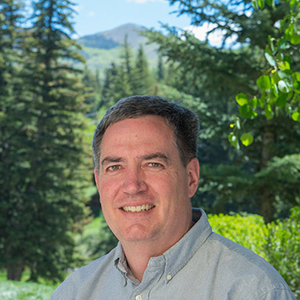
Patrick O’Connell used to be employed at the Public Service Company of New Mexico — that’s PNM, the largest electricity utility in New Mexico, which the PRC regulates. After working there for 20 years, he’s now the clean energy program deputy director for Western Resource Advocates, an organization focused on protecting the environment that also works with utilities.
In nearly 30 years of work at the PNM, Western Resource Advocates and Sangre de Cristo Water Company, he said he’s gained experience in electric, gas, water and wastewater utilities. His top priorities, he said, are giving New Mexicans affordable and reliable energy, especially in sparsely populated rural areas.
And as the globe keeps getting hotter, O’Connell said he wants to encourage the transition to renewable energy to ease human-caused climate change. He said there are more tools than ever to decarbonize the electric grid, and commissioners need to make sure utilities are doing so in a way that’s fair financially to their customers.
“I see fruitful paths to cleaner electricity and know the need for all utilities to make wise investment decisions to maintain reliable, affordable service,” he said in his application. (Megan Gleason)
Brian K. Moore
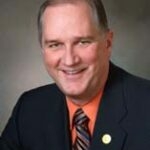
Brian Moore, owner of a grocery store in northeastern New Mexico, is one of few commissioners without an engineering or legal background. Instead, he’s spent most of his life in business management. He also worked as a Republican state representative for eight years, and helped other local and state officials draft legislation. He said in his application that all of this experience would serve the PRC well.
As a commissioner, Moore said he wants to give New Mexicans affordable prices, reliable services and sustain the environment. The state has good opportunities for wind, solar and geothermal energy usage, he said, which can contribute to sustainability and good prices for New Mexicans. It’s up to commissioners to make sure utilities are taking advantage of these opportunities for “cleaner, cheaper and more reliable services,” he said.
Moore previously served on the Renewable Energy Transmission Authority Board, which he said gave him “valuable insights into the challenges that we face as we move toward more sustainable energy, while improving reliability.”
He said the PRC has been caught up in too much drama over the past couple of decades, pointing to the governor pulling the State Fire Marshal division from the purview of the PRC in 2020 and moving it to the Homeland Security and Emergency Management Department. (Megan Gleason)
Carolyn Glick
Acting as a commissioner would be a familiar role to Carolyn Glick, whose previous 16 years spent working as staff at the PRC had many of the same duties. She previously worked as an attorney and then a hearing examiner at the PRC, giving recommendations to commissioners on case rulings. She still does part-time contract work for the commission’s general counsel.
Glick said reliability, sustainability and making sure the state is able to produce enough energy for its population are some of the most important priorities for a commissioner, though other issues rise to the surface depending on the case. She said she has no agenda and wants to work in the public interest rather than for the utilities the PRC oversees.
She has in-depth knowledge, she said, of the rules governing the PRC. Glick said in her application some commissioners sometimes misunderstand the role or don’t follow the rules, especially around the independence of staff members, who can’t communicate with commissioners about closed cases when other parties aren’t there.
Glick said she has ideas about how to improve the PRC, she said, though she didn’t want to list them on the public application. (Megan Gleason)
Kenneth W. Costello
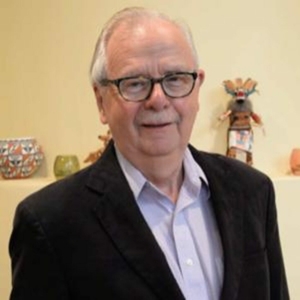
Costello is an economist, consultant and expert on energy policy for the right-leaning Rio Grande Foundation in New Mexico. He studied for a doctorate in economics from the University of Chicago in the 1970s, according to his résumé.
His résumé contains 15 pages of references to papers published in energy-related journals, and presentations he’s given to universities and lawmakers.
“My strong belief is that good regulation requires well-informed commissioners driven to serve the public good,” he wrote in his nominee questionnaire.
In 2020, Costello and the Rio Grande Foundation wrote that they support the constitutional amendment that ultimately would allow Costello to be appointed, rather than elected, to the body.
The PRC’s role in the decarbonization of the economy is to “oversee the utility’s compliance to ensure ratepayers that the utility is prudent by not spending more than necessary,” he said.
He acknowledged that he has “limited knowledge” in the area of the PRC’s relationship with the 23 tribes and pueblos in New Mexico but said he would make sure to “fill this knowledge gap as one of my first tasks.” (Patrick Lohmann)
Gabriel Aguilera
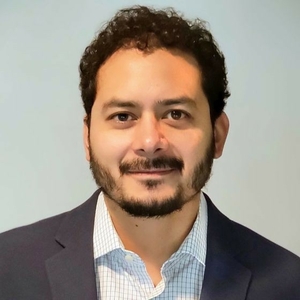
Gabriel Aguilera was raised in southern New Mexico but now lives in Washington, D.C., where he works as a senior policy adviser for the Federal Energy Regulatory Commission. At FERC, he said he’s been focused on regulating utilities, market design and planning in western and southwestern states.
In his nominee questionnaire, he says New Mexico’s PRC is going through a “significant transition” by enabling experienced commissioners to take over.
“My leadership at the PRC would reflect my ability to manage through change and my priority of hiring, developing, and retaining talented staff so that regulated industries have certainty and trust in the commission’s decisions.”
He names as priorities helping New Mexico achieve its “aggressive” zero-carbon targets, plus ensuring that reliable, affordable and sustainable energy is available for New Mexicans.
In a question about the PRC’s history of overstepping, he also said the PRC exceeded its authority by initiating the closure of the San Juan Generating Station, an act that “ultimately served to undermine credibility of the commission’s authority.” (Patrick Lohmann)
Arthur J. O’Donnell
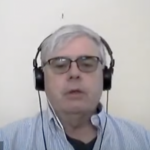
O’Donnell works full time directly with the PRC as a “Solar Innovator Fellow,” an appointment from the United States Department of Energy. Before that, he was an analyst and supervisor for the California Public Utilities Division, an analyst for California’s Wildfire Safety Division and the executive director for an international environmental nonprofit, according to his résumé.
“I know how this commission works, how its work can be improved, and how to motivate and elevate the key staff members who will provide the necessary stability during this transition,” he wrote.
In his questionnaire, he said he takes issue with the idea of “energy independence” at the state level. Instead, he says, the state should not put up walls that preclude it from taking advantage of economic and environmental opportunities, like for exporting wind and solar power or accessing new technology.
“While it is important to understand and encourage utilities … for their positive local economic development contributions, these networks are increasingly two-way flows and interdependent,” he wrote. (Patrick Lohmann)
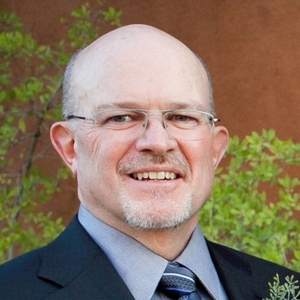
Scott Karns
Karns is a retired systems engineer from Santa Fe and said he is a “lifelong Replublican (sic), which I know is unusual in this part of New Mexico.”
Until September 2017, Karns was a senior principal engineer for L-3 Security and Detection Systems, a company where he designed hardware for radiation detection portals in container shipping facilities in the Netherlands and Colombia, according to his résumé.
“My proven data analysis and problem solving abilities are a good fit with your requirements,” he wrote.
In a questionnaire, he said New Mexico should emulate Wyoming’s energy regulatory policies. Wyoming has the by far the highest per-capita rate of energy exportation, according to Global Trade Magazine.
“Undoubtedly, some of that can be attributed to Wyoming’s wealth of natural resources, but their energy regulatory policies play a role as well,” he wrote.
He also cited the closure of the San Juan Generating Station as one of the biggest decisions in the last 20 years, saying it will have long-term, negative consequences for New Mexico. (Patrick Lohmann)
James F. Ellison
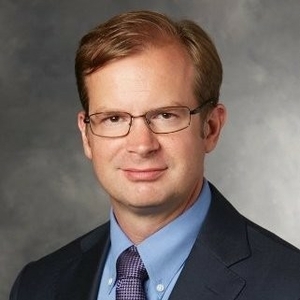
Ellison is a principal grid analyst at Sandia National Laboratories, where he studies solar and wind forecast errors and the amount of reserve energy required to compensate for those errors on the PNM system, according to his résumé.
He’s worked in energy at the labs and founded a firm, Cimarron Power, that engineers and manufactures equipment for energy production with a focus on emissions control.
He said the biggest issue facing the PRC is maintaining reliable and affordable power while also overseeing the transition to renewable energy.
“Not only can New Mexico’s electric utilities play a large role in decarbonizing the economy, they must do so,” he wrote in his questionnaire. (Patrick Lohmann)








